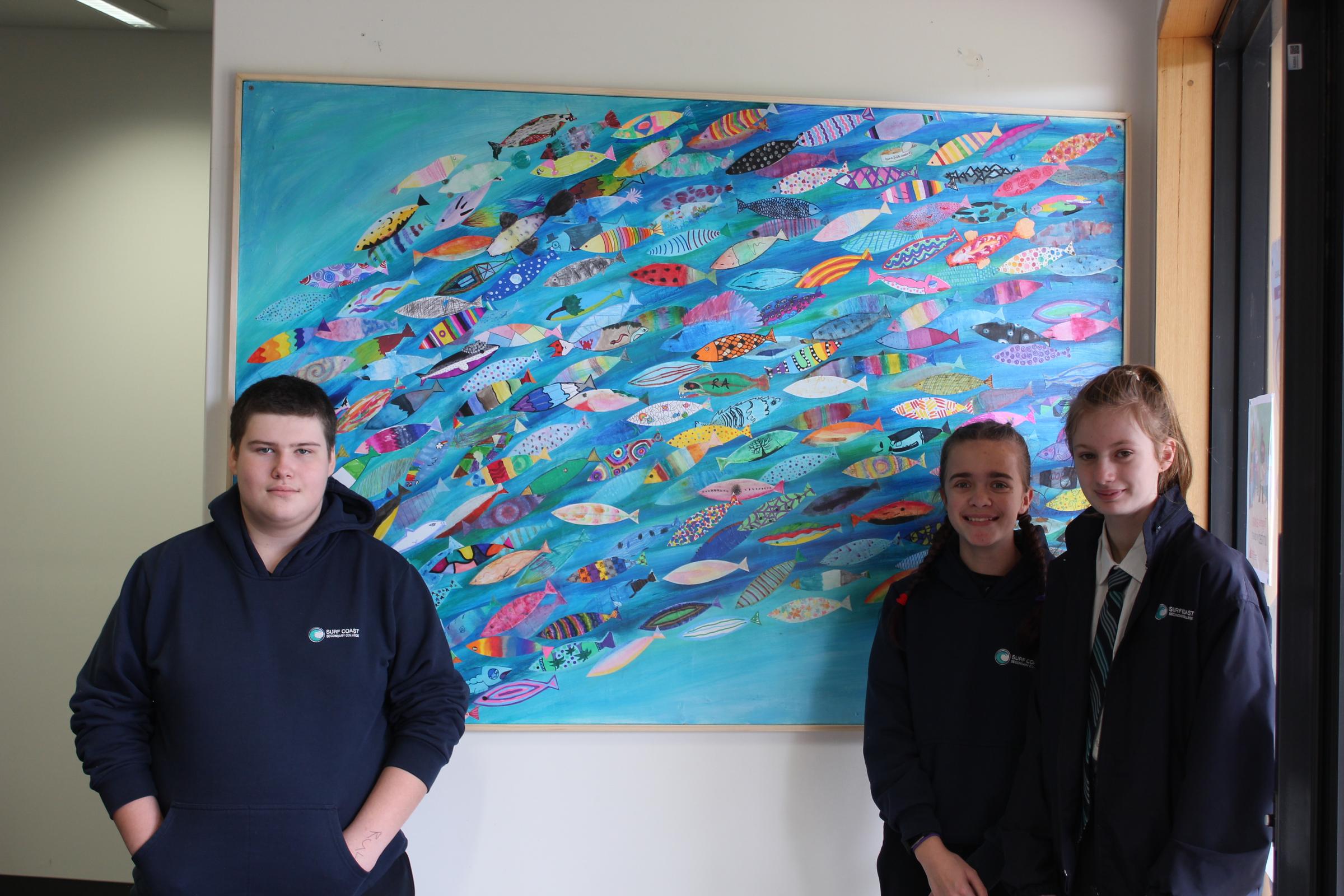WELLBEING

Accessing Wellbeing
Students can access wellbeing via an online booking form for Wellbeing and health related matters.
Student Wellbeing Check In Request Form
Parents/ carers can access supports from Wellbeing for their young person via the Administration Office.
SURFSUP WITH THE WELLBEING TEAM
Welcome back to term 3 from the Wellbeing team. We hope you have had a great break and had a chance to catch up with friends and family. Term 3 is a 10 week term, so it may feel like a long one for some of us. Self-care will be important. Taking time to do things that make you feel good, such as going for a walk, catch ups with a friend or managing some exercise to get the kick of good endorphins should be on all our agendas. Through self-care we can better manage any incoming stress. Please reach out to one of the team if you find yourself struggling with ideas or ways to manage life’s ups and downs.
Sadly, this term we say goodbye to Shelley - Mental Health Practitioner - who has been at this school since it opened in 2012. Shelley has enjoyed working and supporting students from the Torquay community and we wish her all the very best with her new adventures.
This newsletter we thought it would be good to look at how you can talk to your young person about consent. Consent has been recently in the headlines and is often discussed when we look at the different social media platforms that young people are using. Having an open and trusting conversation with your child can be challenging as they may feel that they are in control of things- when possibly they may be overwhelmed and trying to best navigate the world as a teen.
Below are some ways to start the conversation and some useful links to some more information. Your young person will have already had the opportunity to learn about consent in the classroom- however we encourage you to continue their learning about this important subject at home.
About consent and sexual consent
Consent is agreeing to something or giving permission for something.
Sexual consent is agreeing to take part in sexual activity. Consent is when all people involved:
- can choose freely to take part
- can clearly and enthusiastically say they want to take part
- can change their minds at any time and have this decision respected
- are awake, conscious and rational
- understand what kind of activity they’re agreeing to
- are over the legal age for sexual consent.
Sexual consent is essential for:
- kissing someone or touching any part of their body sexually
- having vaginal, anal or oral sex
- sending sexual messages or images
- not using condoms or other contraception.
Sexual consent is essential regardless of gender identity or sexual identity.
Talking about consent with children and teenagers: why it’s important
When your child knows about getting and giving consent, they’re more likely to have healthy, respectful, safe and enjoyable sexual experiences when they’re ready for them.
Early talks when children are young lay the groundwork for open and direct conversations as children get older. For your younger child, you can introduce ideas about consent without relating it to sex. And as your child gets older, you can start talking more openly and directly about sexual consent.
These conversations send the message that your child can come to you for reliable, non-judgmental information about sex. And this is good for your child’s sexual development and relationships.
Once you’ve started talking about consent with your child, you might find talking gets easier the more you do it.
Tips for talking about consent with children and teenagers
No matter how old your child is, these strategies can help you talk about tough topics and have difficult conversations.
1. Have small talks when you get the chance
‘Big talks’ about things like consent can be tricky, so it’s often best to make the most of opportunities when they come up. For example, there might be a scene in a book, TV show or movie that you can use to spark a conversation about consent. If your child doesn’t want to talk about it, you can say you’d like a quick chat anyway.
2. Find out what your child knows or thinks
Open-ended questions can help you do this. For example, ‘What do you think about Prince Charming kissing Sleeping Beauty while she’s asleep?’ or ‘What do you think about the way Han Solo backs Princess Leia into a corner and kisses her?’
3. Correct misinformation and explain things
It’s important to use language and examples your child can understand.
For younger children, your explanation can be about personal boundaries. For example, ‘It’s your body so you can decide who hugs, kisses or tickles you. You can say no if you feel uncomfortable or scared’.
For older children and teenagers, you can be more explicit about sexual consent. For example, ‘You can’t assume someone has given consent for sex, even if you’re in a relationship. It’s always important to ask before sexual activity and keep checking during it’.
4. Check whether your child has questionsIf your child has questions and you don’t know what to say, tell your child you’re glad they asked, that you don’t know the answer, and that you’ll look for some information and get back to them. And then make sure you do get back to your child.
Reinforcing ideas about consent: school-age children and pre-teens
You can keep using many of the tips above to reinforce ideas about consent, respect and personal boundaries for children in the primary school years.
There might also be some new opportunities to talk about and practise consent for children in this age group. For example:
- Teach your child it’s OK to say no to a friend. If your child doesn’t want to go to a playdate or sleepover, this can be a chance for your child to practise saying no kindly. For example, ‘It’s OK not to sleep over at Sam’s place. We could suggest a 9 pm pick-up instead’.
- Respect your child’s feelings if they want privacy when they’re undressing or using the bathroom.
- When the physical changes of puberty start for your child, avoid making comments about your child’s body. You might also need to ask relatives and friends not to comment.
- If your child gets a social media account, talk with them about sharing images. If your child wants to share images of other people, they always need to ask first. Likewise, your child can expect other people to ask for permission before sharing your child’s image. And your child should feel free to say no.
- Talk about your child’s friends and friendships. You could ask your child about the qualities they value in friends and the signs that friends care for and respect them. This can be a way to introduce the idea of respectful relationships.
As your child moves towards the teenage years, you might start to talk about sexual consent more directly. But you can still use everyday opportunities and examples to start conversations. For example, ‘I really like that scene in Frozen where Kristoff asks Anna whether it’s OK for them to kiss. That’s a good example of asking for consent. What do you know about consent?’
Being direct about consent: teenagers
At this age, your teenage child needs to know how to give and get sexual consent.
You can keep using everyday moments or examples from TV shows, movies, books and media stories to get conversations started. But your conversations can focus directly on consent now. For example:
- ‘I liked the way he accepted her decision when she changed her mind about having sex. Why is that important?’
- ‘Does that person look comfortable being touched?’
- ‘I never saw the character ask for consent. How would a person have asked for consent?’
- ‘Do you think the character was able to give proper consent if they were drunk?’
You could also use online resources to get your child thinking and talking about consent. For example, Planned Parenthood – How Do You Know if Someone Wants to Have Sex with You? is a video featuring diverse couples and frank language.
As Always stay kind and reach out if you need too.
Michelle, Mel, Jas, Shelley, and Rachel
Mate Space / Headspace
Headspace Geelong has been hosting Mate Space sessions in Torquay.
These male only sessions are held inside the Youth Centre at KMCC and runs from 4pm-6pm.



